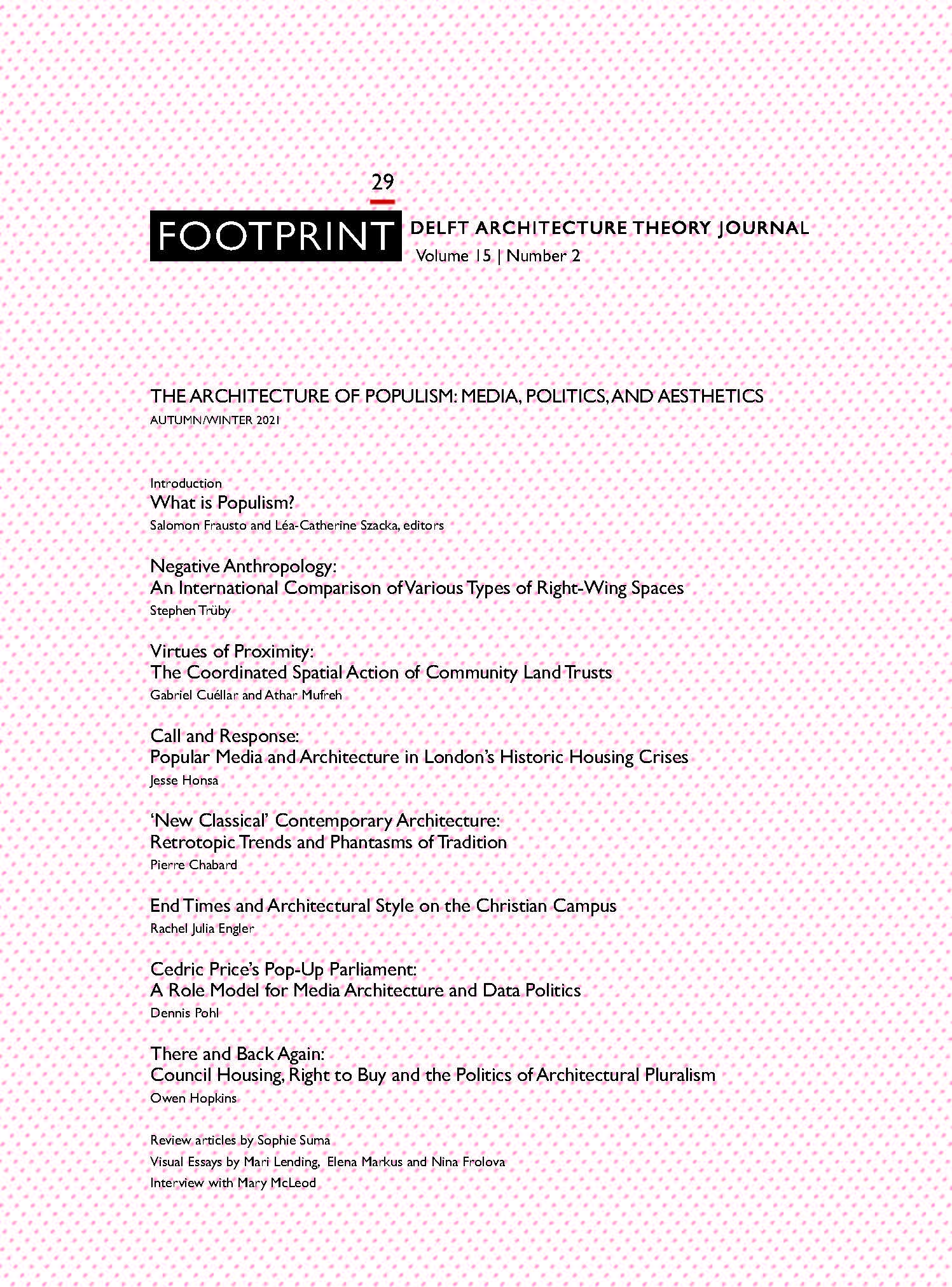'New Classical' Contemporary Architecture
Retrotopic Trends and Phantasms of Tradition
DOI:
https://doi.org/10.7480/footprint.15.2.5402Abstract
Cet article s’attache à retracer la généalogie des idées portés par le réseau anglo-saxon d’architectes new classical qui partagent le souhait de renouer avec les traditions prémodernes et avec une « architecture classique », largement idéalisée et réinventée. Résonnant avec les arguments réactionnaires et identitaires de la droite populiste actuelle, cette doctrine architecturale s’est structurée au tournant des années 1980 au plus fort des débats autour du postmodernisme et s’est développée depuis lors, en dehors des scènes courantes de l’architecture contemporaine, à la faveur d’importants relais politiques (notamment, au Royaume Uni, celui du Prince de Galles) et de la structuration d’un cadre institutionnel et d’une commande spécifiques. Au-delà de leur positionnement stylistique, les protagonistes de cette new classical architecture revendiquent une volonté de revenir aux modes de construction artisanaux traditionnels et manifestent un certain rapport au temps résolument anti-historiciste qui rejoint ce que Zygmunt Bauman a appelé la retrotopia.
References
Archer, Lucy, Raymond Erith, East Anglian Architect (Sudbury (Suffolk): Gainsborough’s House, 1979).
Archer, Lucy, Raymond Erith, Architect (Burford: The Cygnet Press, 1985).
Barber, Lynn, ‘The Shock of the Old’, The Guardian, 7 March 2004.
Bauman, Zygmunt, Retrotopia (Cambridge: Polity Press, 2017).
Boltanski, Luc and Arnaud Esquerre, Enrichment: A Critique of Commodities, trans. Catherine Porter (London: Wiley, 2020 [2017]).
Broadbent, Geoffrey ed., Architectural Design, 49, no. 8–9 (1979) (A.D. Profile no. 23: Neo-Classicism: Schinkel, Johnson, Stirling).
Cannadine, David, ‘The Context, Performance and Meaning of Ritual: The British Monarchy and the “Invention of Tradition”, c. 1820–1977’. Published online by Cambridge University Press: 05 July 2014.
Chabard, Pierre, ‘Fresh Classicism’, Criticat no. 20 (Spring 2018): 66–83.
Colquhoun, Alan, ‘Rational Architecture’, Architectural Design 45, no. 6 (June 1975): 365–70
Chambers, William, A Treatise on the Decorative Part of Civil Architecture (London: J. Haberkorn, 1759).
Creating space for beauty: The Interim Report of the Building Better, Building Beautiful Commission (July 2019).
Dunster, David ed., Edwin Lutyens (London: Academy Editions, 1979).
Ferrari, Federico, Le Populisme esthétique. L’architecture comme outil identitaire (Gollion: InFolio, 2015).
Hind, Charles and Irena Murray, eds., Palladio and His Legacy: A Transatlantic Journey (Venice: Marsilio, 2010).
Hobsbawm, Eric, ‘The Social Function of the Past: Some Questions’, Past and Present 55, no. 1 (May 1972): 3–17.
Hobsbawm, Eric and Terence Ranger, eds., The Invention of Tradition (London: Cambridge University Press, 1983).
HRH The Prince of Wales, Charles, ‘A speech by HRH the Prince of Wales at the 150th anniversary of the Royal Institute of British Architects’, London: Hampton Court Palace, 30 May 1984.
HRH Prince of Wales, Charles, A Vision of Britain: A Personal View of Architecture (London, Doubleday, 1989).
Jencks, Charles, ed., Architectural Design 50, no. 5–6 (1980) (A.D. Profile no. 28: Post-Modern Classicism).
Jencks, Charles, ed., Architectural Design 52, no. 1–2, (1982) (A.D. Profile no. 39: Free-Style Classicism).
Jencks, Charles, ‘Ethics and Prince Charles’, Architectural Design 59, no. 5–6 (1989) (A.D. Profile no. 79: Prince Charles and the Architectural Debate), 26.
John, Richard Robert, Adam: The Search for a Modern Classicism (London: Images Publishing Group, 2010).
Keslacy, Elizabeth, ‘The Alibi of Style: Reading Classicism in Architectural Design Magazine (1979–1982)’, in Mediated Messages: Periodicals, Exhibitions and the Shaping of Postmodern Architecture, ed. Véronique Patteeuw and Léa-Catherine Szacka (London: Bloomsbury, 2018), 175–96.
Krier, Léon, Architecture: Choice or fate (Winterbourne: Papadakis Publisher, 1998), first published in French in 1996.
Laclau, Ernesto, On Populist Reason (London Verso, 2005).
Mathieson, Joe and Tim Verlaan, ‘The Far Right’s Obsession With Modern Architecture’, Failed Architecture, 11 September 2019.
McKellar, Elizabeth, ‘Popularism versus professionalism: John Summerson and the Twentieth-Century Creation of the “Georgian”’, in Articulating British Classicism: New Approaches to Eighteenth-Century Architecture, ed. Barbara Arciszewska and Elizabeth McKellar (London: Ashgate, 2004), 35–56].
O’Brien, Hettie, ‘How Classical Architecture Became a Weapon for the Far Right’, The New Statesman, 21 November 2018.
Parnell, Steve, ‘Acroshaw: Forgotten, but not Forgiven’, Architecture and Culture 6, no. 1 (2018): 37–59.
Parnell, Stephen,, ‘Acroshaw: Forgotten, but not Forgiven’, Architecture and Culture 6, no. 1 (2018): 7–8; John Summerson, John Soane (London: Academy Editions, 1983).
Pentreath, Ben and Georges Saumarez Smith and Francis Terry, Three Classicists: (London: The Bardwell Press, 2010).
Polman, Bart-Jan, ‘A Masochistic Heresy’, The Avery Review no. 40 (May 2019).
Porphyrios, Demetri, Sources of Modern Eclecticism: Studies on Alvar Aalto (London: Academy Editions/New York: St Martin’s Press, 1982).
Porphyrios, Demetri, ‘On the Methodology of Architectural History’, Architectural Design 51, no. 6–7 (1981) (A.D. Profile no. 35: Building & Rational Architecture, ed. Demetri Porphyrios).
Portoghesi, Paolo, ‘The End of Prohibitionism’, in The Presence of the Past, First International Exhibition of Architecture, ed. Gabriella Borsano (Milan: Electa,1980).
Portoghesi, Paolo et all., La Presenza del passato: Prima mostra internazionale di architettura: Corderia dell’Arsenale: La Biennale di Venezia 1980, settore Architettura (Venice: Edizioni La Biennale di Venezia, 1980).
Powers, Alan, ‘Classical Peaceniks’, The Spectator, 22 May 2010.
Rosso, Michela, ‘Il principe Carlo e il dibattito pubblico sull’architettura in Inghilterra’, in 1970–2000. Episodi e temi di storia dell’architettura, ed. Francesca Filippi, Luca Gibello and Manfredo Robilant (Turin : Celid, 2006), 97–106.
Rosso, Michela, ‘Classique et anticlassique : récits de l’architecture en Grande-Bretagne, entre XIXe et XXe siècles’, in Louis Hautecœur et la tradition classique, ed. Antonio Brucculeri (Paris: INHA, 2008).
Rosso, Michela, ‘Heritage, Populism and Anti-Modernism in the Controversy of the Mansion House Square Scheme’, in Re-Framing Identities: Architecture’s Turn to History, 1970–1990, ed. Ákos Moravánszky and Torsten Lange (Basel: Birkhäuser, 2016), 233.
Scruton, Roger, Fools, Frauds and Firebrands: Thinkers of the New Left (London: Bloomsbury, 2015).
Scruton, Roger, The Aesthetics of Architecture (London: Methuen, 1979).
Trüby, Stephan, ‘Right-wing Spaces’, e-flux, 23 January 2017.
Summerson, John, Inigo Jones (Harmondsworth: Penguin Books, 1983 [1966]); John Summerson, The Life and Work of John Nash, Architect (London: Allen & Unwin, 1980); John Summerson, Georgian London (Harmondsworth: Penguin Books, 1978 [1945]).
Tafuri, Manfredo and Georges Teyssot, ‘Classical Melancholies’, in Porphyrios, Classicism is not a Style, 7.
Vidler, Anthony, Histories of the Immediate Present: Inventing Architectural Modernism (Cambridge, MA: MIT Press, 2008).
Charles Renouvier, Uchronie (l'utopie dans l'histoire): Esquisse historique apocryphe du développement de la civilisation européenne tel qu'il n'a pas été, tel qu'il aurait pu être (Paris : La Critique philosophique, 1876), II.
Downloads
Published
Issue
Section
License
Copyright (c) 2022 Pierre Chabard

This work is licensed under a Creative Commons Attribution 4.0 International License.
- Authors retain copyright and grant the journal right of first publication with the work simultaneously licensed under a Creative Commons Attribution License that allows others to share the work with an acknowledgement of the work's authorship and initial publication in this journal.
- Authors are able to enter into separate, additional contractual arrangements for the non-exclusive distribution of the journal's published version of the work (e.g., post it to an institutional repository or publish it in a book), with an acknowledgement of its initial publication in this journal.





